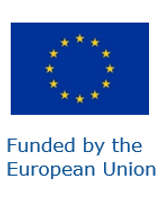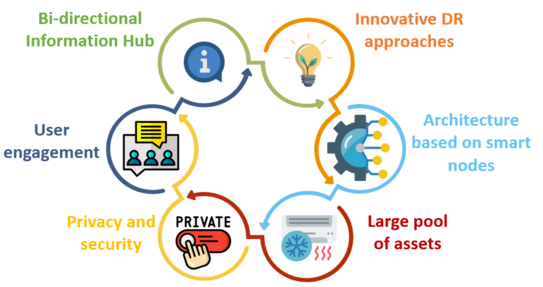DR-RISE - Demand Response - Residential Innovation for a Sustainable Energy system
Research area Innovation and education in the digital society | Dr. Michael Kohlgrüber | Dr. Rick Hölsgens | Dr. Tobias Wienzek | Beata Lewandowska
Due to the current energy crisis, the EU is reaching a critical point in the energy transition with the Clean Energy Package. Residential demand response (DR) is a promising framework whose potential is completely untapped nowadays. DR-RISE's main objective is to demonstrate the benefits of DR in the residential sector, not only for the end-consumers but for the overall energy system and the actors involved.

European Commission – Horizon Europe
Due to the current energy crisis, the EU is reaching a critical point in the energy transition with the Clean Energy Package. Residential demand response (DR) is a promising framework whose potential is completely untapped nowadays - Demand response is the management of demand for grid services (here: electricity) in order to create a balance between energy production and energy demand.
DR-RISE's main objective is to demonstrate the benefits of DR in the residential sector, not only for the end-consumers but for the overall energy system and the actors involved. We will offer a holistic set of tools and services with a twofold objective: increase energy efficiency via optimal management and demonstrate the benefits (not only economic) of DR. The platform will be demonstrated in three different EU countries, focusing on gathering the most diverse environments (e.g., pre-existing energy communities, smart villages, urban blocks of flats, low-income households, etc.). Our approach is completely aligned with the EU's vision to place the citizens at the heart of the solution and empower them so that they can make self-aware decisions. Furthermore, we have developed a methodology around a strong social component that includes a significant co-design process of the tools with the end-consumers, considering vulnerable groups to provide a completely inclusive solution.
A first iteration in the pilots will be deployed to assess the DR benefits, including the minimum required devices to do so. Then, building on the previous results, we will iterate a second time by including new hardware and DR approaches to compare the outcomes with the previous baseline.
This two-phased methodology will allow us to take corrective measures if needed and assess the potential benefits of multiple sensors and control devices. The platform will therefore reach TRL7/8 by project completion. Furthermore, our plan for dissemination and exploitation, including communication activities, contemplates building the energy helix to reach more than 150 relevant organisations and potentiate clustering activities with initiatives such as BRIDGE and Built4People.
- IDENER Research and Development (IDE, Coordination)
- CTIC (Centro Technologico Asturias)
- STAM SRL (STAM)
- ELECTRA ENERGY COOPERATIVE (ELE)
- Technische Universität Dortmund (TUDO)
- ADVANTIC SISTEMAS Y SERVICIOS SL (ADV)
- CROWDHELIX LIMITED (CHX)
- DGS SPA (DGS)
- ELECTRODISTRIBUTION GRID WEST AD (EDG)
- SOUTHEAST EUROPEAN TECHNOLOGICAL COMPANY LTD (SET)
- SMART ENERGY EUROPE (SMA)
- VOLTALIS SA (VOLT)
- TRILATERAL RESEARCH LIMITED (TRI)

The proposed solution will tap the potential of residential buildings and increase their relevance in the energy sector, guiding their transition from a historically passive role to active energy management participation. DR-RISE will build upon six fundamental concepts to achieve such an ambitious objective, as depicted in the figure.
DR-RISE will provide the users with a smart node-based architecture to interact with innovative DR approaches and to provide flexibility considering all the assets at their disposal without disrupting their desired comfort level. Such an architecture will consider not only the end-consumers but also the needs, requirements and constraints of other agents involved to enable residential DR from the market point of view.
Furthermore, the DR-RISE solution will be enclosed in a privacy and security framework and continuously interact with the end-consumers to foster their participation. Ultimately, the feedback and interaction between the agents mentioned above will lead to flexibility capacity to reduce the burden on the grid during demand peak times. On a global scope, all of the above will result in positive economic flows for both parties that can, in turn, be used to increase the penetration of renewable energy sources to achieve the ambitious goal of a decarbonised economy.
In detail, the following concrete project goals are pursued:
- Demonstrate the benefits of DR in the residential sector
- Analyse the barriers and hindrances to residential DR to better understand the needs of the different agents involved and foster their participation
- Ensure democracy and fairness to all individuals through fair value creation, user behavioural research, user co-design and other similar actions assuring social acceptance
- Provide the digital tools and services necessary to enable and valorise energy flexibility and increase energy efficiency in the residential sector
- Demonstrate the benefits of residential DR and validate the proposed technology and architecture through iterative testing on a variety of pilots across Europe
- Increase the awareness and engagement of target groups from outside the project scope




![[Translate to English:] [Translate to English:]](/storages/zentraler_bilderpool/_processed_/a/f/csm_Kontakt_b86e8d8ecc.png)
![[Translate to English:] [Translate to English:]](/storages/sfs-sowi/_processed_/6/c/csm_Glasfront_sfs_Header_eae6d325d3.jpg)
